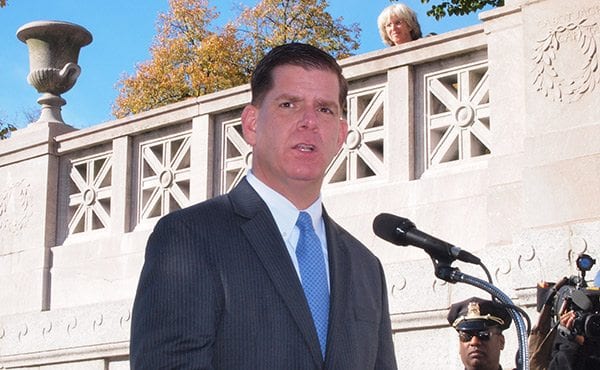
Mayor-elect Marty Walsh says he will make sweeping changes to the Boston Redevelopment Authority, moving development planning to a separate agency and making the development process more transparent and accountable to neighborhood residents.
The changes are at the heart of Walsh’s “Fourteen-Point Plan for Economic Development in Boston,” which would restructure the BRA for the first time in more than 50 years.
The highlights of Walsh’s plan include the creation of the Boston Economic Development Authority, an entity separate from the BRA that would be responsible for planning, research. The new agency would have its own manager and board and be subject to oversight by the Boston City Council.
Boston City Councilor Felix Arroyo, a co-chairman of Walsh’s transition team, said he wholly supports the mayor-elect’s call for more transparency in the development process.
“What comes up from residents and developers is the same and that is more transparency,” Arroyo told the Banner. “Everyone wants to be very clear about the process and what it takes.”
A key step toward greater transparency is a requirement that the BRA give greater explanation of why decisions are made and make sure that all projects that are approved are done so based on merit, Arroyo said.
“Right now, frankly, it feels like it isn’t clear what the community process always is and how much input the community has on a project,” he said.
From a developer’s perspective, according to Arroyo, the feeling is the process of getting a project done from start to finish is not clear and they do not have confidence in exactly what they have to do to make sure their proposals become a reality.
While Walsh’s call for separating the planning function at the BRA from development worries some, Arroyo maintains that neighborhood activists are in support of the move.
“This needs to be fixed — that is the perception in the neighborhoods and the only way to deal with that perception is to actually fix it,” Arroyo said.
He emphasizes that people want to see change happen — they don’t want to just hear politicians continue to talk about changing the BRA and the development process without some kind of structure change in the way things are done.
Lydia Lowe, director of the Chinese Progressive Association, says that her organization’s work with development projects in Chinatown have long resulted in a call for change to the way BRA does business.
“I definitely think the BRA needs either elimination or reform,” Lowe said. “I think there has been major problems with the lack of transparency.”
Lowe said that with all the development pressure on Chinatown, the community and her organization are constantly involved in feedback on proposed or planned development, but the feeling is that their comments fall on deaf ears even when it comes through public meetings set up specifically to hear what the community has to think about development.
“None of it really matters to the BRA,” she said. “They go about doing want they want anyway.”
Lowe is encouraged that Mayor-elect Walsh has promised to address the issues with the BRA and she does believe something will get done. She called the establishment of such a new agency — especially one with greater accountability — very “promising.”
“I think that the mayor-elect is sincere in wanting to see reform,” she said. “He is sincere and like us he is concerned about how to stabilize working class neighborhoods in the city.”
However, she does not expect the change to come overnight and recognizes that much of what Walsh is suggesting will take time and legislation. She expects it would take at least a year to see a new organization established, such as the Boston Economic Development Authority that Walsh is proposing.
In the short run, she would like to see more immediate changes and better efforts with neighborhoods and communities in the development process.
“There still is a lot that could be done that could make the process more democratic in the immediate future,” she said.
For now, though, she said her organization can do little but hope Walsh delivers on his campaign promise in regards to the BRA and development. “A lot of people are in a wait and see mode,” she added.
Samuel Tyler, president of the Boston Municipal Research Bureau, cautions against too much dramatic change in the BRA and the current development process. In September, his organization released a report on the importance of development in Boston, which pointed out that the city’s “heavy reliance on property tax makes development a high priority.”
According to the report, Boston relied on the property tax for 66.5 percent of its operating revenue in fiscal year 2013 and points out that new growth has driven the average annual increase in the property tax levy to 4.8 percent from 2008 to 2013.
“Under these conditions, the city’s fiscal health and its ability to balance the budget and finance new programs or initiatives relies, in good part, on new growth — new development, major rehabilitation, conversion of a property from tax-exempt to taxable status, and personal property tax growth,” the report stated.
It also pointed out that “new commercial development generates additional revenue for affordable housing and job training. These properties also impose less of a cost burden for city services such as schools, public works, and parks.”
Tyler said he agrees with calls for greater transparency in the planning and development process, but cautions against moves that would slow down the process of getting development projects through, arguing that developers could turn away from Boston if the process becomes slower or more complicated.
“It if gets slower the calculation may be that those who are funding those projects will put their money in other cities,” he said. “There is a bigger perspective that needs to be put on the changes and what is involved.”






